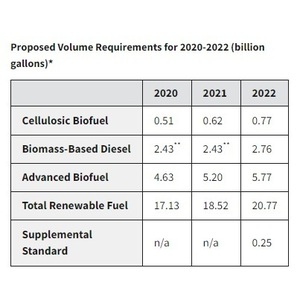Comment periods on RFS RVO, SRE rules to close Feb. 4, Feb. 7




January 31, 2022
BY Erin Krueger
Members of the biofuel industry who wish to comment on the U.S. EPA’s proposed rule to set 2020, 2021 and 2022 Renewable Fuel Standard renewable volume obligations (RVOs) have less than a week to do so. The public comment period on the proposed rule closes Feb. 4. A separate comment period on the agency’s proposal to deny more than 60 small refinery exemptions (SREs) closes Feb. 7.
The EPA released a proposed rule to revise existing 2020 RVOs and set new RVOs for 2021 and 2022 on Dec. 7.
For 2020, the EPA is proposing to reduce the total RVO for renewable fuel to 17.13 billion gallons, down from 20.09 billion gallons as finalized in late 2019. The nested RVO for advanced biofuel would be set at 4.63 billion gallons, down from 5.09 billion. The RVO for biomass-based diesel would be maintained at 2.43 billion gallons, while the cellulosic biofuel RVO would be set at 510 million gallons, down from 590 million gallons. The agency said it is proposing to revise 2020 RVOs to account for challenges the program and the market faced during the year, including from the COVID-19 pandemic.
Advertisement
For 2021, the EPA is proposing to set the RVO for total renewable fuel at 18.52 billion gallons, including 5.2 billion gallons of advanced biofuel, 2.43 billion gallons of biomass-based diesel, and 620 million gallons of cellulosic biofuel. The EPA said the 2021 RVOs are being proposed at the level the agency projects the market used during the 2021 calendar year.
For 2022, the EPA is proposing to set the RVO for total renewable fuel at 20.77 billion gallons, including 5.77 billion gallons of advanced biofuel, 2.76 billion gallons of biomass-based diesel, and 770 million gallons of cellulosic biofuel. The agency is also proposing to add a 250-million-gallon supplemental obligation and has stated its intent to add another 250-million-gallon supplemental obligation in 2023. The supplemental obligations would address the remand of the 2014-2016 annual rule by the D.C. Court of Appeals in Americans for Clean Energy v. EPA. The agency said spreading the obligation over two years would provide the market time to respond to the supplemental obligation.
The RVO rule also includes a variety of other provisions, including language to allow for the production, transfer and use of biointermediates to generate qualifying fuel under the RFS program. In addition the proposal includes provisions to change the biomass-based diesel weighting factor from 1.50 to 1.55, changes to registration for baseline volumes, changes to attest engagements for parties owning renewable identification numbers (RINs), the treatment of confidential business information, clarifying the definition of agricultural digesters and several other changes and minor corrections.
In the SRE proposal, the EPA proposes to deny more than 60 pending SREs from small refineries seeking exemptions from the RFS program for one or more compliance years between 2016 and 2021. The agency said the proposed decision results from its review of the pending SRE petitions and supporting information, its legal, technical and policy analysis of the Clean Air Act provisions related to small refineries, and its application of the holding of the U.S. Court of Appeals for the Tenth Circuit in Renewable Fuels Association et al. v. EPA.
Advertisement
Members of the public can file comments on the RVO proposed rule through Feb. 4 on the Regulations.gov website under Docket ID No. EPA-HQ-OAR-2021-0324. According to data posted to the Federal Register, 543 public comments have already been filed on the proposed rule.
Comments on the SRE proposal can be filed through Feb. 7 on Regulations.gov under Docket ID No. EPA-HQ-OAR-2021-0566. According to the Federal Register, members of the public have filed 102 comments on the SRE proposal to date.
Upcoming Events





